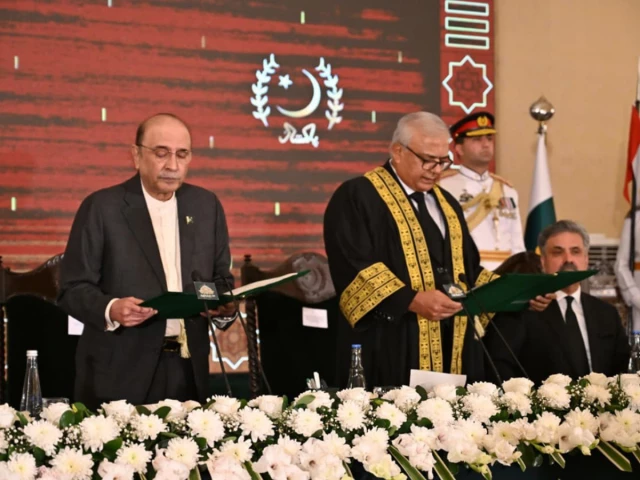The government intended the FCC to start operating from the Federal Sharia Court; However, FSC judges protested
President Asif Ali Zardari administers the oath of office to Justice Aminuddin Khan as Chief Justice of the Federal Constitutional Court during a ceremony at Aiwan-i-Sadr on Friday. Photo: APP
ISLAMABAD:
The newly created Federal Constitutional Court (FCC) is grappling with its first legal and administrative challenges in its earliest days, with uncertainty over its permanent location, staffing and the battle of perceptions surrounding its legitimacy.
At present, there is no clarity on where the FCC will ultimately be housed. So far it has been housed in Islamabad High Court (IHC) premises. However, Courtroom No. 1 has not been made available to the CJ of the FCC for hearings.
Previously, the government had intended for the FCC to start operating from the Federal Sharia Court (FSC). The plan stalled due to objections from FSC judges.
Several FCC judges, including CJ Aminuddin Khan, used their chambers in the Supreme Court building on Monday. Senior lawyers argue that the judges should formally start operating from the SC premises.
Meanwhile, the FCC has begun hiring retired civil servants and judges for administrative positions. However, advocates believe that to reduce costs, the FCC should consider using existing SC employees for administrative roles.
A Supreme Court official claimed that thousands of cases are expected to be transferred to the FCC for adjudication, adding that handling and disposing of the backlog will pose a major challenge to the newly created court.
Meanwhile, leading lawyers are urging the FCC to prioritize cases involving interpretation of the law and the Constitution rather than immediately taking up public interest issues of maladministration or bad governance.
They emphasize that the FCC should first establish clear parameters for public interest litigation.
Advocate Faisal Chaudhry said lawyers remain unsure whether to file the case with the SC or the FCC as there is still no clarity on their respective jurisdictions. The FCC has not yet formulated its rules of procedure. At present, divisional benches deal with cases in the absence of a fully developed set of rules.
The FCC judges also face a “battle of perception” since they were appointed by the federal government, which itself is expected to be the primary plaintiff before the court.
The challenge now facing the judges is to demonstrate that they are not “executive-minded” and will dispense justice “without fear or favour”.
A leading lawyer who challenged the 26th Amendment believes the bar should avoid petitioning against the 27th Amendment at this time, arguing that “the executive branch has total control over the judiciary”. Adding to the growing momentum, the Sindh High Court Bar Association has announced a convention on November 21 to oppose the 27th Amendment.
Meanwhile, it has emerged that former SC judge Mansoor Ali Shah, who resigned in protest against the constitutional amendment, is currently not inclined to visit bar associations.
Justice (retd) Shah is expected to spend a few months in Lahore or possibly abroad as he has been offered international arbitration work and a position with LUMS. He intends to pursue academic interests in the international arena.



